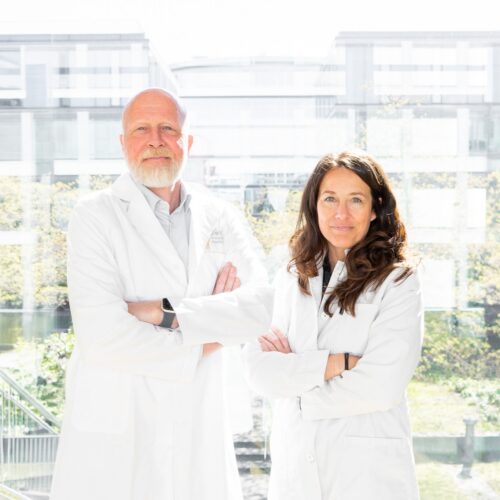Sometimes a brain tumor grows back despite surgery, radiation, and chemotherapy – especially with Grade 4 glioblastoma. When standard therapy is exhausted, affected individuals and relatives often feel in a no-man’s-land without perspective. But this is exactly where we step in: At our Center for Neuro-Oncological Neurosurgery, we do not leave you alone.
Gliomas are biologically complex: They grow infiltratively into healthy tissue, develop resistances to therapies, and consist of different cell types. Therefore, standard care is often not sufficient. Our approach goes further – with translational precision medicine that transfers the latest research results directly into treatment. With over 3500 operations, we have particular expertise in the operative treatment of recurrences.
We individually check whether a second chemotherapy, a medication change, or participation in a study is possible. If this is not an option, we open up alternative, scientifically sound options beyond routine care. You benefit from short waiting times, tailored concepts, and an interdisciplinary expert team.
Three Steps to Your Individual Therapy:
- Findings upload via our secure portal
- Analysis in the interdisciplinary tumor board
- Personal consultation discussing all options
In recent years, immunotherapy has made great progress in oncology. The principle: The body’s own defense system is influenced so that it recognizes and fights cancer cells. Especially with some systemic cancers – such as melanoma (black skin cancer) or certain lung and kidney cancers – immunotherapies have already achieved great successes, even when brain metastases were present. Patients with melanoma metastasized to the brain who receive immune checkpoint inhibitors (special antibodies) today often live significantly longer and sometimes even tumor-free, where there was hardly any hope before. These results fuel the hope that immunotherapy can also open new paths for brain tumors.
At our Center for Neuro-Oncological Neurosurgery, we specialize in the most modern immunotherapies and precision medicine tailored to the individual tumor biology of each patient. Our interdisciplinary team of neurosurgeons, oncologists, and immunologists works together to offer therapy options that go beyond standard procedures.
A particularly individual approach to treating brain tumors is offered by personalized vaccines (vaccines). The idea behind it: Similar to how a protective vaccine prepares the immune system for a virus, therapy vaccinations are meant to target the immune system specifically at tumor cells. The vaccine material is tailored to the respective tumor of the patient – hence personalized. These methods are suitable especially for patients with newly diagnosed or recurrent glioblastoma.
There are various types of such vaccines:
- Dendritic Cell Vaccines:A personalized vaccine made from the patient’s own immune cells (dendritic cells). These are “trained” to recognize and fight tumor-specific proteins.
- mRNA Vaccines:Genetically programmed vaccinations for targeted activation of the immune system.
- Peptide Vaccination:Synthetic tumor markers are injected to activate the immune system against cancer cells.
The Center for Neuro-Oncological Neurosurgery at Beta Klinik Bonn has experience with several forms of tumor vaccination, particularly vaccination with dendritic cells (within the framework of a large clinical study led by our doctors). In the interdisciplinary case review, we analyze whether such treatment forms are sensible for you.
In our center, we pursue a precision medicine approach to tailor the treatment of brain tumors even more precisely to the individual biology of the tumor. For this, the genetic profile of the tumor tissue is analyzed to identify mutations or signaling pathways that can be used therapeutically. On this basis, tailored therapies can be recommended – especially when standard procedures like surgery, radiation, or chemotherapy are not sufficiently effective.
Elements of Our Approach:
- Tumor Sequencing:Analysis of the genetic profile to identify treatable mutations.
- Tailored Treatment:Use of
- Checkpoint inhibitors (e.g., PD-1/PD-L1 blockers) that reactivate immune cells.
- Targeted medications that block growth-promoting signals in tumor cells.
- Prerequisite:Obtaining tumor tissue through biopsy or operation.
Worldwide, numerous clinical studies are running to further improve the treatment of brain tumors. For example, it is being investigated whether existing medications work in new combinations. Also, completely new substances or approaches are being used in studies that aim to, for instance, specifically influence the tumor microenvironment and block tumor regeneration after radiation. For patients with an “exhausted” Grade 4 glioblastoma, but also other brain tumor diseases, participation in such studies can represent an important chance – be it to benefit from a novel active substance or to pave the way for future patients.
At Beta Klinik, we fundamentally check for every patient whether there are current studies or therapy innovations that could be suitable for you, and advise you on the options of study participation. We make every decision together with you calmly and weighing all factors – with empathy and professional competence.
Even without – or supplementing – surgery, there are diverse treatment paths for brain tumors. From proven radiation and chemotherapy for brain tumors to the most modern immunotherapies and vaccines – neuro-oncology is rapidly evolving.
Our goal at Beta Klinik Bonn is to create the individually best therapy plan for every patient. We combine established procedures with innovative approaches wherever it is sensible and desired. Personal care is just as important to us as the highest medical quality. Do not hesitate to ask questions and openly express your worries – we listen to you. Together we fight against the tumor, and we do everything to ensure that you gain as much time and quality of life as possible on this path.







